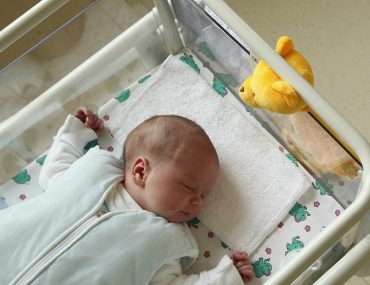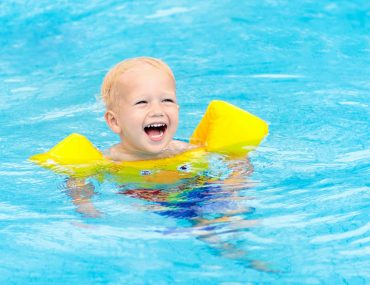Surely, preventing the spread of the virus to your kids isn’t enough. In the case where your kid contracts the virus, being naïve about how kids react with the disease is a risk no parent would want to take. There is a slightly different body reaction when it comes to coronavirus and kids compared to adults. This means the virus does not affect both with the same intensity and sometimes the expectation of the parents might be wrongly misplaced. This increases the chances of an infected child going unnoticed. Here are the things you need to know about how kids interact with the coronavirus, signs of infection, and what to do.
RELATED: Singing With Your Kid In the Bathroom
Children May Have Mild Symptoms
Both children and adults have the same symptoms when infected with the coronavirus. However, the symptoms are milder in infected kids than they are in adults. With coronavirus and kids, the symptoms of infected children include fever, runny nose, and cough. Sometimes, vomiting and diarrhea accompany the initial symptoms. Research has shown that children with underlying medical conditions may be at higher risk of suffering more serious symptoms brought on by the virus. This is why you must ensure your child’s immune system is at optimum performance. You can do this by treating any illness they have with all seriousness, regardless of how minute.
RELATED: Using A Baby Bath Sink Insert
Kids Are Not Immune
A 13-year-old was reported to have died from the coronavirus infection. There have also been other reported cases of fatality in kids from different parts of the world. This shows that children are not immune to the effects or the coronavirus. They may display milder symptoms when compared to infected adults, but they are just as vulnerable. Without proper preventive measures or immediate medical treatment in the case of infection, a COVID-19 positive child will suffer the same fate as anybody else. It is important to remember this amidst all the whirlwind of claims that the virus only affects the elderly. If you show any symptoms related to COVID-19 avoid bathing with your newborn baby.
How The Virus Spreads
The novel coronavirus is a respiratory virus that spreads via fluids discharged by infected individuals. These fluids include but are not limited to saliva, and cough/sneeze droplets. When a person who is not infected comes in contact with these droplets they risk catching the virus. However, merely coming in contact with the droplets does not guarantee a person will contact coronavirus. The uninfected person has to get these droplets in their mouth, nose, or even eyes before they get infected. This is why the CDC strongly advises against touching your face as this increases the risk of transmitting these droplets from surfaces into any of these openings. The best time to bathe baby would be after any contact with an outside person.
Using Face Masks
Who should use a mask, and what is the proper way to do so? Everybody is advised to wear a cloth mask. For infected individuals, the mask prevents them from transmitting the virus to others, while for non-carriers the mask prevents them from contracting the virus through the nose and mouth. Cloth masks are to be used by people older than 2 years who have no difficulty breathing. You also shouldn’t leave your child alone while they are wearing one of these to avoid a case of accidental suffocation. The CDC offers guides on how to correctly wear a face mask, as well as how to make your own.
Preventive Measures
Infected individuals should always cover their mouths with a tissue when they cough or sneeze and then dispose of the tissue afterward. They also need to wash their hands immediately using soap and water as described by the CDC’s guide to handwashing with soap and water. Alcohol-based sanitizers are a quick-fix for this, but generally, soap and water is more effective. Infected individuals must also use separate dishes, cups, and all eating utensils while staying in a separate bedroom. As a mother in this age of coronavirus and kids, it is imperative that you avoid bathing with your newborn baby, or even bathing them. You should also use a separate bathroom from other people.
RELATED: Small Bathroom Organization Tips
Coronavirus And Kids In School
A lot of governments have declared a stay home order for an indefinite period depending on when the fight against the coronavirus yields massive positive outcomes. However, if your kid still attends school (for some reason) you should reconsider that decision. Schools are one of the places where the virus could easily be transmitted, and kids are not good at keeping their distance. Do not place your kid at any daycare – there is no need for that right now. You should stay at home with your kid until the government gives a directive that it is safe to go out.
Can An Infected Mother Breastfeed Her Baby
Based on research and current scientific information available, the CDC recommends that an infected mother can continue to breastfeed her baby. This is of course while following all the other necessary precautions for dealing with coronavirus and kids. A caregiver must clean the baby after every contact with the mother. The mother is also expected to wear a face mask and wash her hands before and after contact with the baby. In the case where the mother is too ill to breastfeed, she should dispense milk to a clean cup and feed the baby or have someone else do it.
Coronavirus And Kids: Unborn Babies
There isn’t any evidence on coronavirus and kids to determine if unborn babies can contract the novel coronavirus in the womb. However, there have been at least two cases of pregnant women who had the virus and gave birth. One of them infected the kid while the other gave birth to a healthy kid. Pregnant women need to protect themselves like every other person and also seek medical attention if they display any symptoms related to COVID-19. Although research is being conducted on this matter, it’s best to practice absolute prevention methods because no mother would want to risk transmitting the virus to her kids.
If Your Kid Displays Symptoms
You need to act fast if your kid displays symptoms of COVID-19. Seek a medical examination immediately. Do not delay even for a day before having them examined so they don’t infect another person. Although keep in mind that it’s flu season so there is a chance your kid is only coming down with the flu. Symptoms of the coronavirus such as cough or fever can resemble those of the flu which occur more frequently. You should keep your kid well vaccinated from these ailments so you won’t have to take them to the hospital where they have a higher chance of contracting the coronavirus itself. The evening is the best time to bathe baby, after the day’s activities.
Reliable Information Sources
Some websites provide reliable information on coronavirus and kids. These websites list all the symptoms of the virus, the mode of transmission, and how to reduce the risk of acquiring the virus – in detail. Instead of getting information from social media and the likes, you can visit the CDC official website for the latest scientific findings on the novel coronavirus, as well as the current world statistics. You can also check out UNICEF’s website for tips on proper hygiene for children. There are tons of resources on the internet on coronavirus and kids that can help you properly navigate the times, but you need to be careful not to consume unverified information.
NEXT: 10 Essential Baby Items















